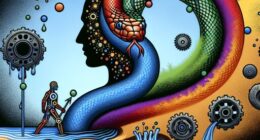How to Work Smarter, Not Harder, with Artificial Intelligence
Imagine a future where the focus isn’t on competing with machines, but on honing the skills necessary to collaborate with them. As artificial intelligence (AI) continues to revolutionize industries like healthcare, finance, entertainment, and education, the necessity for professionals versed in AI’s intricacies is rapidly increasing. However, the terrain of AI can appear daunting, with its complex algorithms, expansive datasets, and constantly evolving tools.
The encouraging news is that you don’t have to possess the mind of a mathematical maestro or a coding whiz to thrive in this ever-growing field. By concentrating on some vital AI skills, you can place yourself at the cutting edge of this technological tide, ready to innovate, adapt, and lead change. In the following discussion, we’ll explore key competencies essential for success in AI, as outlined by experts like Tina Huang. These range from mastering basic programming languages to understanding the profound ethical considerations that AI systems entail.
Programming is foundational to AI development, serving as the backbone for model construction, algorithm implementation, and solution scalability. Languages such as Python, R, and JavaScript are indispensable tools that allow you to code efficiently and maintainably, essential skills for any AI professional.
Equally crucial is a strong grounding in mathematical principles, the bedrock for creating reliable AI systems. Understanding linear algebra, calculus, probability, and statistics is vital, as these areas furnish the theoretical scaffolding for the development of sophisticated algorithms and models capable of solving intricate problems.
Machine Learning (ML) powers the core of AI, enabling systems to glean insights from data and enhance performance over time. Proficiency in ML methodologies such as supervised learning, unsupervised learning, and reinforcement learning is essential for selecting effective strategies tailored to distinct challenges, underscoring the indispensability of ML knowledge in AI progression.
Data, the essence of AI, underscores the necessity of adept data handling to construct accurate models. Mastering ways to cleanse, organize, and interpret data is critical, ensuring that AI systems rest on a foundation of high-quality, reliable information.
Deep learning, an advanced facet of machine learning, focuses on mimicking human brain structure through neural networks. This is particularly potent for addressing intricate problems. Familiarity with frameworks like TensorFlow and PyTorch is crucial, enabling the design, training, and deployment of deep learning models for tasks such as computer vision and natural language understanding.
As AI embeds more deeply into everyday life, ethical considerations grow ever more vital. Building responsible AI systems entails grappling with bias, ensuring privacy, nurturing transparency, and guaranteeing accountability. By prioritizing ethical practices, you bolster the creation of fair, transparent, and trustworthy AI solutions.
Deploying AI models on cloud platforms such as AWS, Google Cloud, and Microsoft Azure is essential for scaling and accessibility. These platforms not only support the deployment of powerful AI solutions but also ensure they are accessible and versatile for various applications.
Furthermore, effective communication stands as a pivotal skill for AI professionals, crucial for conveying complex ideas to non-expert audiences. Strong communication skills can enhance collaboration, deepen understanding, and ensure the success of AI projects by bridging the gap between technical and non-technical realms.
Whether you’re embarking on your AI journey or you’re already a seasoned tech enthusiast, gaining these skills will empower you to not merely keep pace with AI but shape its future. Embracing the AI era isn’t solely about acquiring knowledge—it’s fundamentally about appreciating its significance and potential impact.
So, as you prepare to embrace the future of work with AI, remember that the path to thriving isn’t just about learning new things. It’s also about understanding why these advancements matter and how they can be harnessed to innovate and solve the world’s pressing challenges.
For additional information, refer to our exhaustive library of articles on AI skills. By keeping abreast of ongoing developments, and continually enhancing your expertise, you’ll be well-prepared to excel in a world dominated by AI.










